By Leen Randell
Updated: Jul 10, 2024
10 Best Herbal Decoctions For Shortness Of Breath
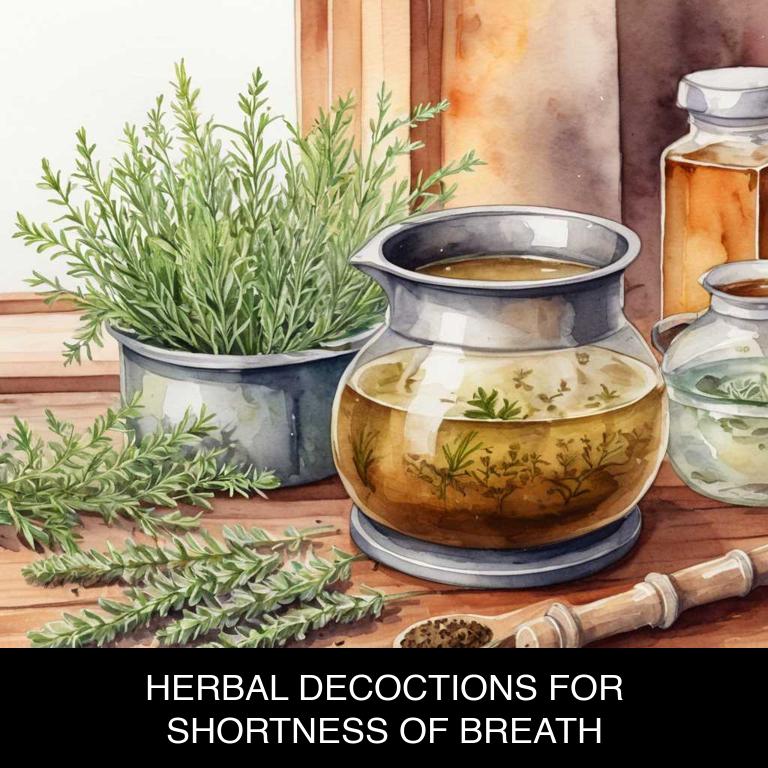
Herbal decoctions for shortness of breath are liquid extracts made by steeping herbs in hot water, which can provide relief from respiratory distress.
These decoctions work by soothing and relaxing the airways, reducing inflammation and congestion, and promoting easier breathing. For example, peppermint, eucalyptus, and ginger decoctions have natural anti-inflammatory properties that help ease bronchial constriction, while licorice root and slippery elm decoctions soothe irritated lungs.
By improving airflow and reducing discomfort, these herbal remedies can greatly improve the quality of life for individuals suffering from shortness of breath, enabling them to engage in daily activities with renewed confidence and energy.
The following article describes in detail the most important decoctions for shortness of breath, including medicinal properties, parts of herbs to use, and recipes for preparations.
- 1. Glycyrrhiza glabra
- 2. Echinacea purpurea
- 3. Thymus vulgaris
- 4. Asclepias tuberosa
- 5. Eupatorium perfoliatum
- 6. Mentha x piperita
- 7. Verbena officinalis
- 8. Taraxacum officinale
- 9. Achillea millefolium
- 10. Foeniculum vulgare
- What is the best combination of herbal decoctions to use for shortness of breath?
- What ailments similar to shortness of breath are treated with herbal decoctions?
1. Glycyrrhiza glabra
Licorice decoctions helps with shortness of breath because they contain bioactive compounds that help to relax and dilate the airways, making it easier for air to pass in and out.
The soothing properties of licorice root also reduce inflammation and irritation in the lungs and bronchi, allowing for improved airflow and increased oxygen intake.
Additionally, licorice decoctions have been shown to increase the production of surfactant, a natural lubricant that helps to prevent sticking and collapsing of the air sacs in the lungs, further reducing respiratory distress.

Medicinal Constituents
The list below shows the primary medicinal constituents in Glycyrrhiza glabra decoctions that help with shortness of breath.
- Glycyrrhizic acid: This triterpenoid saponin helps with shortness of breath by reducing inflammation in the airways and lungs, making it easier to breathe.
- Liquiritin: A flavonoid glycoside, liquiritin helps alleviate shortness of breath by acting as a bronchodilator, relaxing the airway muscles and increasing airflow.
- 18β-glycyrrhetinic acid: This triterpenoid acid has anti-inflammatory properties that may help reduce congestion and inflammation in the airways, making it easier to breathe.
Parts Used
The list below shows the primary parts of licorice used to make decoctions for shortness of breath.
- Roots: The roots are the primary part used due to their high content of glycyrrhizin, a compound known to have anti-inflammatory properties that can help alleviate respiratory issues.
- Leaves: Leaves are also used in decoctions, as they contain flavonoids and saponins that have bronchodilatory effects, helping to relieve shortness of breath.
- Stems: Stems are used in some decoctions, as they contain similar compounds to the roots, including glycyrrhizin, which can help reduce inflammation and improve respiratory function.
Quick Recipe
The following recipe gives a procedure to make a basic licorice for shortness of breath.
- Gather 5-10 grams of dried glycyrrhiza glabra root and clean it thoroughly with a soft brush.
- Boil 1 liter of water in a saucepan and add the cleaned glycyrrhiza glabra root.
- Reduce the heat to a simmer and let the decoction boil for 30-40 minutes.
- Strain the decoction through a cheesecloth or a fine-mesh sieve into a clean container.
- Allow the decoction to cool down to room temperature before serving or storing it in the refrigerator.
2. Echinacea purpurea
Purple coneflower decoctions helps with shortness of breath because they contain antioxidants and anti-inflammatory compounds that help to relax bronchial muscles, reduce airway constriction, and alleviate inflammation in the lungs.
The decoction's expectorant properties also help to loosen and clear mucus from the airways, making it easier to breathe.
Additionally, the herb's natural antispasmodic effects can help to calm coughing fits and soothe irritated throats, further reducing symptoms of shortness of breath.
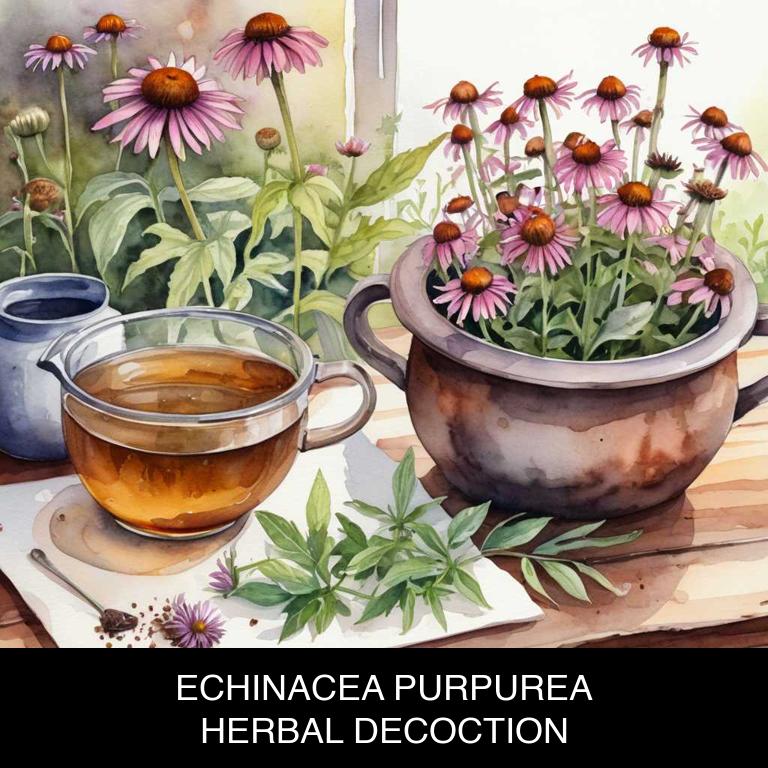
Medicinal Constituents
The list below shows the primary medicinal constituents in Echinacea purpurea decoctions that help with shortness of breath.
- Isoquinoline alkaloids: These compounds have anti-inflammatory properties, which can reduce inflammation in the airways and alleviate symptoms of shortness of breath.
- Flavonoids: As antioxidants, flavonoids can help protect the lungs from oxidative stress and damage caused by free radicals, which may contribute to shortness of breath.
- Cichoric acid: This caffeic acid derivative has anti-inflammatory and immunomodulatory effects, which can help reduce inflammation and modulate the immune response to alleviate respiratory issues, including shortness of breath.
Parts Used
The list below shows the primary parts of purple coneflower used to make decoctions for shortness of breath.
- Roots: The roots of Echinacea purpurea contain compounds that help to reduce inflammation and promote lung health, making them a popular choice for treating shortness of breath.
- Leaves: The leaves of Echinacea purpurea are rich in antioxidants and have anti-inflammatory properties, which can help to alleviate respiratory issues and improve breathing.
- Flowers: The flowers of Echinacea purpurea are used to make decoctions that help to soothe the respiratory tract, reduce inflammation, and improve lung function, making them a popular choice for treating shortness of breath.
Quick Recipe
The following recipe gives a procedure to make a basic purple coneflower for shortness of breath.
- Gather 30 grams of dried echinacea purpurea roots and 15 grams of dried flowers to prepare the decoction.
- Crush the dried roots and flowers into smaller pieces using a mortar and pestle or coffee grinder.
- Combine the crushed roots and flowers with 1 liter of boiling water in a large saucepan or pot.
- Reduce heat to a simmer and let the mixture steep for 30 to 45 minutes to allow the active compounds to infuse.
- Strain the decoction through a cheesecloth or fine-mesh sieve into a clean container and discard the solids.
3. Thymus vulgaris
Thyme decoctions helps with shortness of breath because it has natural expectorant properties that loosen and clear mucus from the airways, making it easier to breathe.
The antimicrobial compounds in thyme also help reduce inflammation and congestion in the lungs, allowing for more efficient oxygen exchange. Additionally, thyme's vasodilatory effects can help relax bronchial muscles, further improving airflow and alleviating shortness of breath symptoms.
This natural remedy can provide relief from respiratory issues and promote overall lung health.
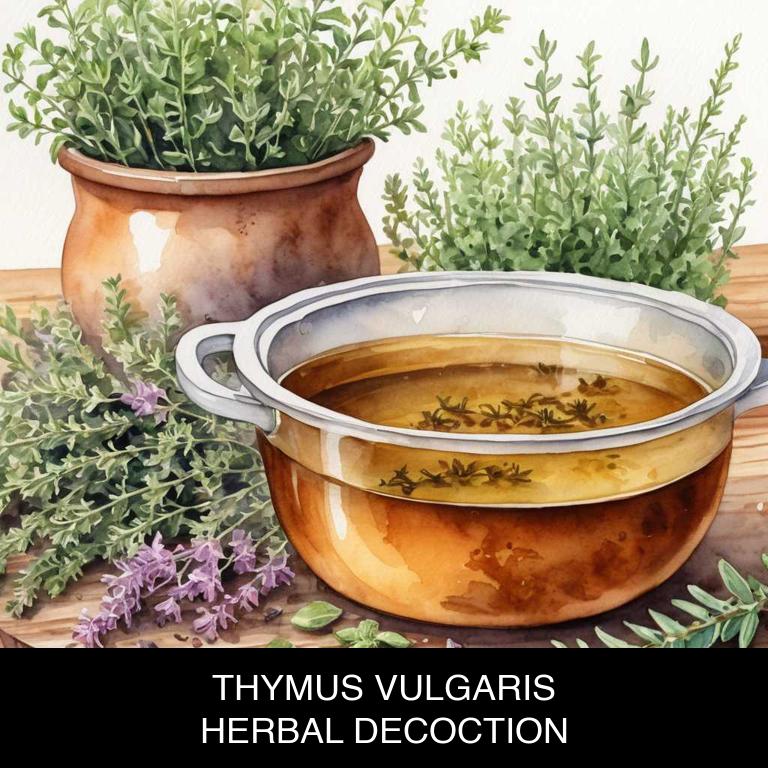
Medicinal Constituents
The list below shows the primary medicinal constituents in Thymus vulgaris decoctions that help with shortness of breath.
- Thymol: Thymol acts as a bronchodilator, helping to open up airways and improve breathing in individuals with shortness of breath.
- Caryophyllene oxide: Caryophyllene oxide is known to exhibit anti-inflammatory properties, which can reduce inflammation in the airways and alleviate shortness of breath.
- Rosmarinic acid: Rosmarinic acid has antioxidant and anti-inflammatory effects, which can help protect the lungs from oxidative damage and inflammation, thereby reducing the severity of shortness of breath.
Parts Used
The list below shows the primary parts of thyme used to make decoctions for shortness of breath.
- Leaves: Used due to their high concentration of thymol, which has expectorant properties to help relieve respiratory issues.
- Stems: Employed in decoctions for their ability to stimulate the nervous system and promote respiratory function.
- Buds: Utilized in traditional medicine for their expectorant properties and ability to reduce inflammation in the respiratory tract.
Quick Recipe
The following recipe gives a procedure to make a basic thyme for shortness of breath.
- Gather 2-3 tablespoons of dried thymus vulgaris leaves and stems from a trusted herbal source.
- Combine the dried thymus vulgaris with 1 quart of boiling water in a heat-resistant container.
- Steep the mixture for 5-10 minutes in a warm dark place to allow flavors to infuse.
- Strain the liquid through a cheesecloth or fine-mesh sieve into a separate container.
- Allow the decoction to cool completely before refrigerating or freezing for later use.
4. Asclepias tuberosa
Butterfly milkweed decoctions helps with shortness of breath because it contains a unique combination of flavonoids, saponins, and other bioactive compounds that work together to dilate bronchial airways and reduce inflammation in the lungs.
As a natural expectorant, it helps loosen and clear mucus from the respiratory tract, making it easier to breathe.
Additionally, its anti-inflammatory properties soothe irritated lung tissues and help calm the body's response to allergens or irritants, providing welcome relief for individuals struggling with chronic shortness of breath.
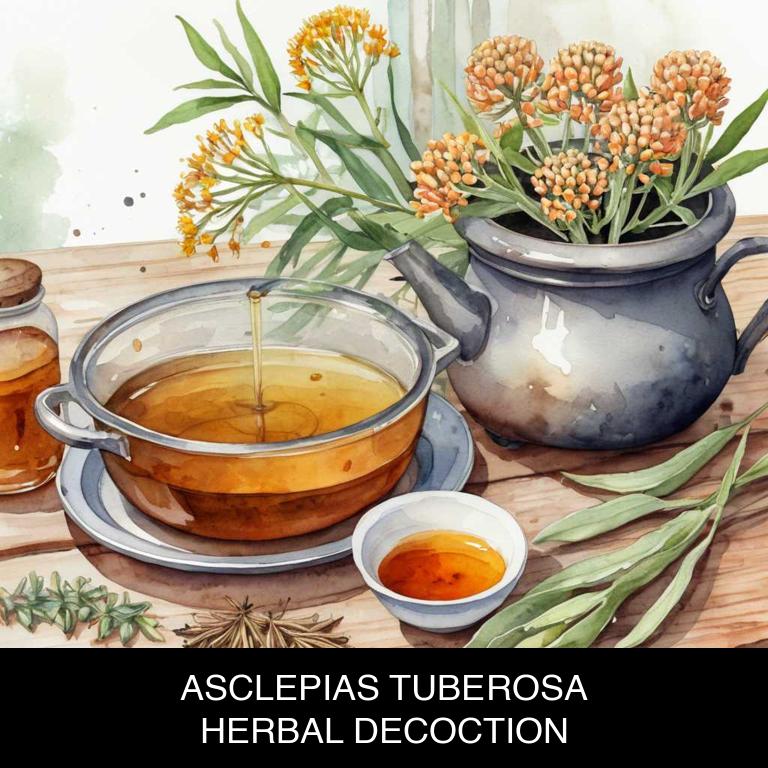
Medicinal Constituents
The list below shows the primary medicinal constituents in Asclepias tuberosa decoctions that help with shortness of breath.
- Saponins: These compounds help alleviate shortness of breath by reducing inflammation and improving lung function, which can help alleviate respiratory issues.
- Asclepianone: This alkaloid constituent has shown potential in opening airways and reducing inflammation in the lungs, thereby helping to alleviate shortness of breath.
- Triterpenoids: These compounds have anti-inflammatory properties that can help reduce swelling in the lungs, improve air flow, and alleviate shortness of breath.
Parts Used
The list below shows the primary parts of butterfly milkweed used to make decoctions for shortness of breath.
- Roots: They are used due to their high concentration of iridoid glycosides, which are believed to have expectorant and anti-inflammatory properties.
- Leaves: They are utilized for their antispasmodic and anti-inflammatory properties, which can help alleviate respiratory issues like shortness of breath.
- Flowers: They are used in decoctions due to their high concentration of saponins, which have expectorant properties that help relieve respiratory congestion.
Quick Recipe
The following recipe gives a procedure to make a basic butterfly milkweed for shortness of breath.
- Gather 10-20 fresh roots of asclepias tuberosa and clean them thoroughly with water.
- Chop the cleaned roots into small pieces and measure out 5 grams for decoction.
- Combine the chopped roots with 1 liter of water in a saucepan and bring to a boil.
- Reduce the heat to a simmer and let the mixture steep for 10-15 minutes.
- Strain the decoction through a cheesecloth or a fine-mesh sieve into a clean container.
5. Eupatorium perfoliatum
Joe pye weed decoctions helps with shortness of breath because it has a natural bronchodilatory effect, allowing for easier airflow in and out of the lungs.
The decoction's active compounds, such as taraxasterol and beta-amyrin, work to relax airway muscles, reducing inflammation and constriction.
This relaxation helps to open up the airways, making it easier to breathe deeply and comfortably, alleviating symptoms of shortness of breath.
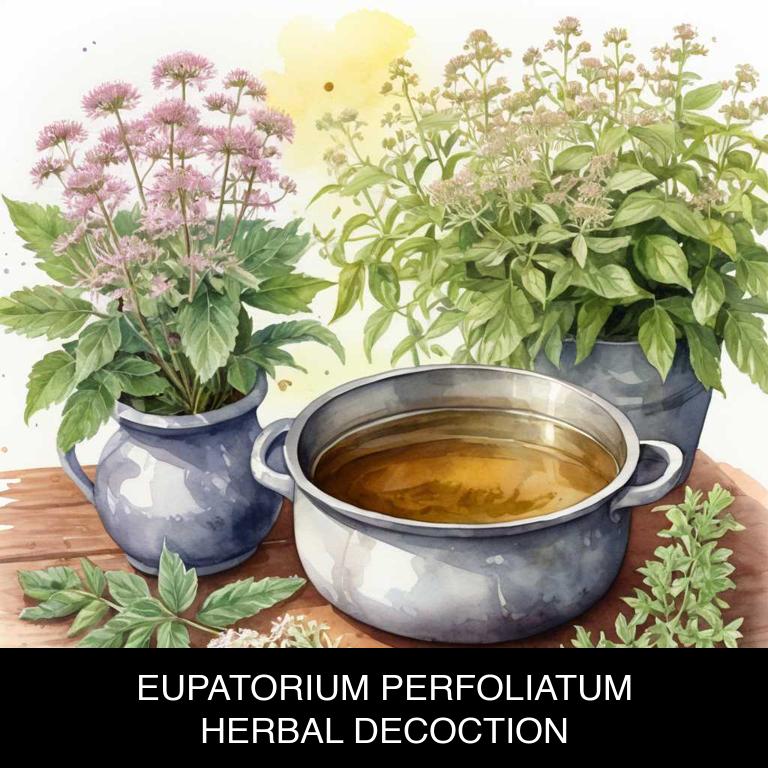
Medicinal Constituents
The list below shows the primary medicinal constituents in Eupatorium perfoliatum decoctions that help with shortness of breath.
- Eupatorin: Eupatorin, a flavonoid glycoside, helps alleviate shortness of breath by inhibiting inflammatory responses and improving lung function.
- Quercetin: Quercetin, a polyphenolic flavonoid, helps with shortness of breath by reducing oxidative stress and inflammation in the lungs, which can contribute to respiratory issues.
- Kaempferol: Kaempferol, a flavonoid, helps alleviate shortness of breath by possessing anti-inflammatory and antioxidant properties, which can help improve lung function and reduce inflammation.
Parts Used
The list below shows the primary parts of joe pye weed used to make decoctions for shortness of breath.
- Roots: The roots are commonly used due to their high concentration of medicinal compounds that help relieve respiratory issues.
- Leaves: The leaves are often used in decoctions because they contain flavonoids and other bioactive compounds that help alleviate shortness of breath and coughs.
- Stems: The stems are sometimes used due to their ability to provide a soothing effect on the respiratory system, which can help alleviate shortness of breath and other respiratory issues.
Quick Recipe
The following recipe gives a procedure to make a basic joe pye weed for shortness of breath.
- Harvest eupatorium perfoliatum flowers and leaves in the summer months when the plant is in full bloom.
- Clean and dry the eupatorium perfoliatum flowers and leaves to prevent contamination and spoilage.
- Combine 1-2 cups of dried eupatorium perfoliatum flowers and leaves with 4 cups of boiling water in a pot.
- Steep the mixture for 10-15 minutes then strain the liquid to remove the plant material from the decoction.
- Store the decoction in the refrigerator for up to 3 days and consume 1/2 cup 2-3 times a day as needed.
6. Mentha x piperita
Peppermint decoctions helps with shortness of breath because it relaxes the airways, reducing inflammation and constriction that can cause wheezing and shortness of breath.
The menthol in peppermint also helps to thin mucus, making it easier to expel and clearing out blocked airways. Additionally, peppermint's expectorant properties help to loosen and cough up phlegm, further alleviating congestion and reducing the sensation of shortness of breath.
By promoting smooth airflow and clearing out obstructions, peppermint decoctions can provide rapid relief from respiratory issues.
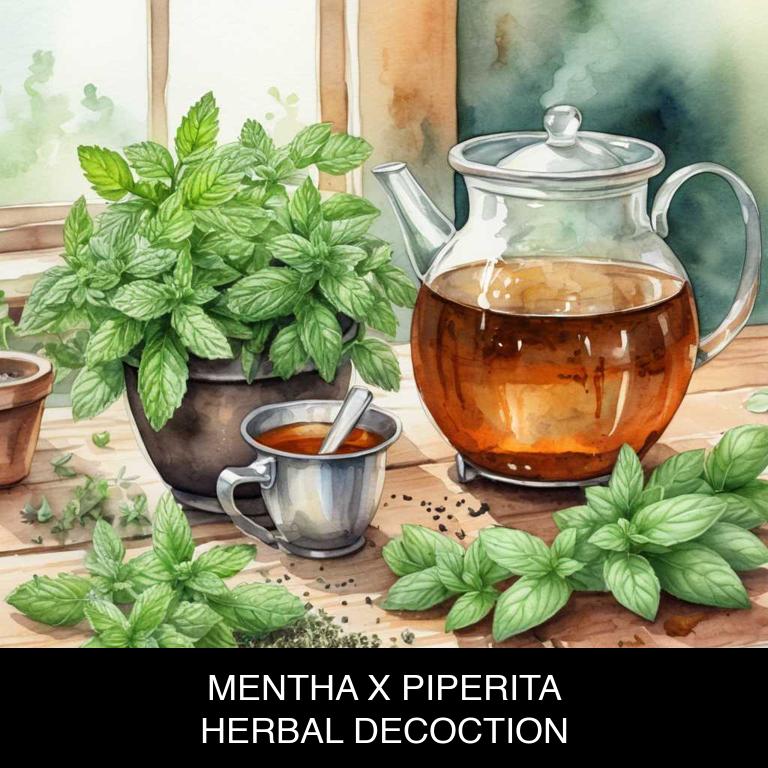
Medicinal Constituents
The list below shows the primary medicinal constituents in Mentha x piperita decoctions that help with shortness of breath.
- Menthol: Menthol acts as a bronchodilator, helping to relax airway muscles and increase airflow, thereby alleviating shortness of breath.
- Menthone: Menthone has anti-inflammatory properties, which may help reduce swelling and inflammation in the airways, making it easier to breathe.
- Menthanol: Menthanol exhibits expectorant properties, which facilitate the removal of mucus and other secretions from the airways, allowing for easier breathing.
Parts Used
The list below shows the primary parts of peppermint used to make decoctions for shortness of breath.
- Leaves: Known for their expectorant properties, helping to loosen and clear mucus from the lungs and airways.
- Roots: Contain menthone, which has been used to ease respiratory issues and reduce inflammation in the lungs.
- Stems: Also contain menthone and other compounds that may help to alleviate shortness of breath by promoting relaxation and reducing stress.
Quick Recipe
The following recipe gives a procedure to make a basic peppermint for shortness of breath.
- Harvest 20-30 grams of fresh mentha x piperita leaves and flowers in the early morning.
- Chop the fresh leaves and flowers into small pieces and crush them in a mortar.
- Combine the crushed plant material with 500 milliliters of boiling water in a heat-resistant container.
- Steep the mixture for 5-7 minutes and then strain it through a cheesecloth into a separate container.
- Discard the solids and store the decoction in the refrigerator for up to 24 hours.
7. Verbena officinalis
Lemon verbena decoctions helps with shortness of breath because its unique combination of flavonoids, phenolic acids, and volatile oils exhibits expectorant properties.
The decoction's anti-inflammatory compounds relax the airways, reducing constriction and easing breathing difficulties. Additionally, lemon verbena's natural antispasmodic effects help calm bronchial spasms, allowing for smoother airflow and improved lung function.
As a result, herbal lemon verbena decoctions offer relief from shortness of breath, making it an effective natural remedy for respiratory issues.
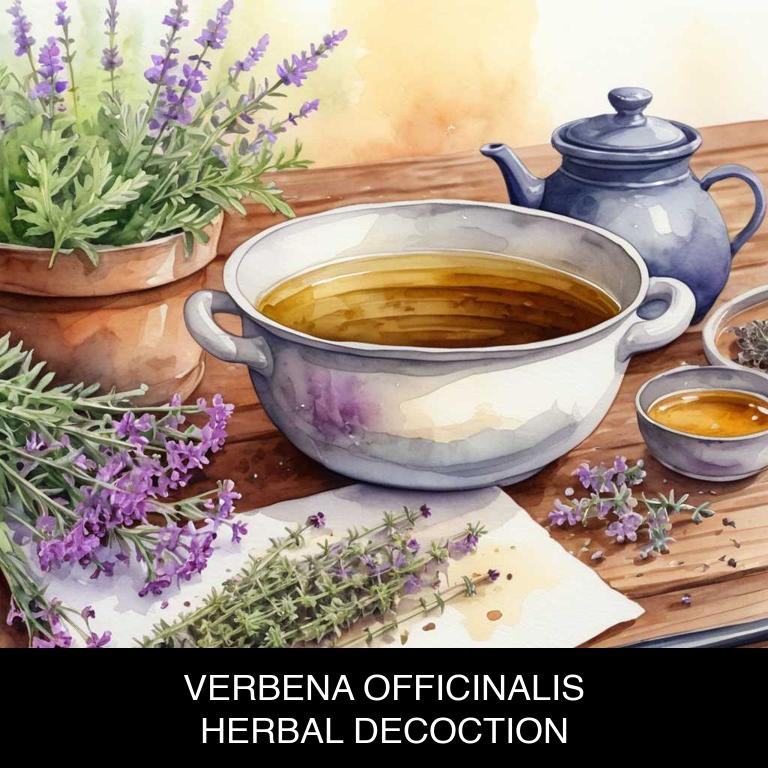
Medicinal Constituents
The list below shows the primary medicinal constituents in Verbena officinalis decoctions that help with shortness of breath.
- Phenolic acids: These compounds help alleviate shortness of breath by reducing inflammation in the airways and lungs, thus improving respiratory function.
- Flavonoids: These flavonoids possess antioxidant and anti-inflammatory properties, which can help to relax the airway muscles and improve oxygen flow to the lungs.
- Terpenes: These terpenes have bronchodilatory effects, which means they help to open up airways, allowing for easier breathing and relieving shortness of breath symptoms.
Parts Used
The list below shows the primary parts of lemon verbena used to make decoctions for shortness of breath.
- Leaves: The leaves are used because they contain volatile oils and flavonoids that have been traditionally used to relieve respiratory issues, including shortness of breath.
- Flowers: The flowers are used because they contain fragrant oils and flavonoids that help to relax the airways and alleviate breathing difficulties.
- Roots: The roots are used because they contain compounds like verbascoside, which helps to relax the respiratory system and alleviate symptoms of shortness of breath.
Quick Recipe
The following recipe gives a procedure to make a basic lemon verbena for shortness of breath.
- Harvest fresh or dried verbena officinalis leaves and flowers in the morning when dew is still present.
- Measure out 1-2 teaspoons of dried plant material or 2-3 teaspoons of fresh material.
- Combine the measured plant material with 1 cup of boiling water in a heat-resistant glass or ceramic container.
- Allow the decoction to steep for 5-10 minutes then strain it using a fine-mesh sieve or cheesecloth.
- Store the cooled decoction in the refrigerator for up to 24 hours before consumption.
8. Taraxacum officinale
Dandelion decoctions helps with shortness of breath because it acts as a natural bronchodilator, relaxing the airways and increasing lung capacity.
The herb's anti-inflammatory properties help reduce inflammation in the lungs and airways, making it easier to breathe. Additionally, dandelion's diuretic effect can help remove excess fluid from the body, which can contribute to breathing difficulties.
By promoting healthy digestion and reducing congestion, dandelion decoctions can provide relief from shortness of breath and improve overall respiratory function.

Medicinal Constituents
The list below shows the primary medicinal constituents in Taraxacum officinale decoctions that help with shortness of breath.
- Flavonoids: These plant compounds help alleviate shortness of breath by improving blood circulation, reducing inflammation, and acting as antioxidants to protect the lungs from oxidative stress.
- Phenolic acids: These compounds have anti-inflammatory properties, which can help reduce swelling in the airways and improve breathing, making it easier to breathe and alleviate shortness of breath.
- Inulin: This type of prebiotic fiber can help maintain healthy gut bacteria, which is essential for immune system function and reducing inflammation in the body, including the respiratory system, thereby alleviating shortness of breath.
Parts Used
The list below shows the primary parts of dandelion used to make decoctions for shortness of breath.
- Leaves: Leaves are used due to their high content of taraxasterol and other compounds believed to have bronchodilatory effects.
- Roots: Roots are used for their expectorant and anti-inflammatory properties, which may help relieve shortness of breath.
- Flowers: Flowers are used because they contain flavonoids and other compounds that may help reduce inflammation and improve respiratory function.
Quick Recipe
The following recipe gives a procedure to make a basic dandelion for shortness of breath.
- Harvest 10-20 fresh taraxacum officinale roots and clean them thoroughly to remove any dirt or debris.
- Chop the roots into small pieces and combine them with 2 cups of water in a saucepan.
- Bring the mixture to a boil then reduce heat and let it simmer for 10-15 minutes.
- Strain the decoction through a cheesecloth or a fine-mesh sieve to remove the plant material.
- Store the final decoction in the refrigerator for up to 3 days before consumption.
9. Achillea millefolium
Yarrow decoctions helps with shortness of breath because they have a calming effect on the respiratory system.
The flavonoids present in yarrow help to relax the airways, reducing inflammation and spasms that can constrict breathing passages. Additionally, yarrow's expectorant properties help to loosen and clear mucus from the lungs, further alleviating congestion and making it easier to breathe.
By promoting healthy lung function, yarrow decoctions can provide relief for individuals experiencing shortness of breath due to conditions such as asthma or chronic bronchitis.
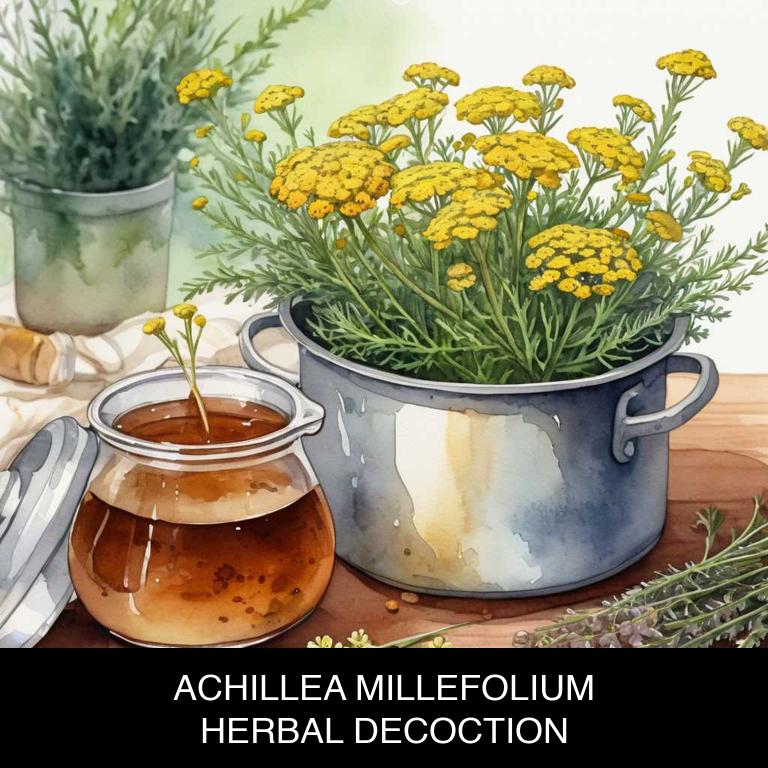
Medicinal Constituents
The list below shows the primary medicinal constituents in Achillea millefolium decoctions that help with shortness of breath.
- Phenolic acids: Help alleviate shortness of breath by acting as antioxidants and reducing inflammation in the airways, which can improve breathing capacity.
- Flavonoids: Contribute to improved respiratory function by relaxing bronchial muscles and reducing spasms, allowing for easier breathing.
- Tannins: Help soothe and protect the mucous membranes in the airways, reducing irritation and inflammation that can cause shortness of breath.
Parts Used
The list below shows the primary parts of yarrow used to make decoctions for shortness of breath.
- Leaves: The leaves contain a high concentration of essential oils, particularly sesquiterpene lactones, which contribute to their medicinal properties.
- Flowers: The flowers are a rich source of volatile oils and flavonoids, which help to relax the airways and improve breathing.
- Roots: The roots are valued for their ability to help regulate the respiratory system and reduce inflammation in the lungs, which can contribute to shortness of breath.
Quick Recipe
The following recipe gives a procedure to make a basic yarrow for shortness of breath.
- Harvest 10-20 fresh achillea millefolium flowers and leaves in the early morning or late afternoon.
- Dry the harvested material in a warm well-ventilated area for 7-10 days.
- Mix 2-3 teaspoons of dried flowers and leaves with 1 quart of boiling water.
- Steep the mixture for 5-7 minutes to allow the herbal properties to infuse.
- Strain the decoction and discard the solids to enjoy the herbal remedy.
10. Foeniculum vulgare
Fennel decoctions helps with shortness of breath because its expectorant properties help to loosen and clear mucus from the lungs, allowing for easier breathing.
The decoction's anti-inflammatory compounds also reduce inflammation in the airways, making it easier for oxygen to flow freely. Additionally, fennel's natural bronchodilator effects help to dilate the airways, increasing lung capacity and alleviating feelings of shortness of breath.
By addressing these underlying causes, fennel decoctions can provide effective relief from respiratory distress.
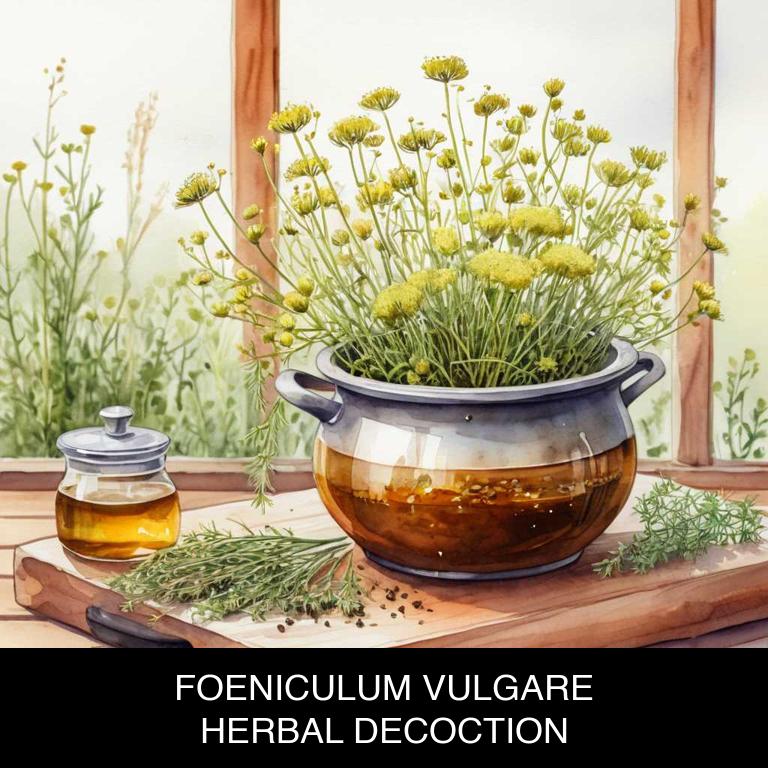
Medicinal Constituents
The list below shows the primary medicinal constituents in Foeniculum vulgare decoctions that help with shortness of breath.
- Foeniculin: A sesquiterpene lactone found in Foeniculum vulgare, which helps alleviate shortness of breath by exhibiting expectorant properties, aiding in the removal of mucus from the airways.
- Anethole: A phenolic ether found in Foeniculum vulgare, which helps relieve shortness of breath by acting as an antispasmodic, relaxing the smooth muscle in the bronchial tubes and improving airflow.
- Daucosterol: A triterpenoid saponin found in Foeniculum vulgare, which helps alleviate shortness of breath by exhibiting anti-inflammatory properties, reducing inflammation in the airways and facilitating easier breathing.
Parts Used
The list below shows the primary parts of fennel used to make decoctions for shortness of breath.
- Leaves: They are used due to their high content of volatile oils, which provide expectorant and anti-inflammatory properties.
- Seeds: They are used for their carminative and anti-spasmodic properties, helping to ease breathing and reduce inflammation in the respiratory tract.
- Roots: They are used due to their rich content of volatile oils and coumarin, which have expectorant, anti-inflammatory, and bronchodilatory effects.
Quick Recipe
The following recipe gives a procedure to make a basic fennel for shortness of breath.
- Gather foeniculum vulgare seeds or roots in quantities of 2-4 teaspoons per cup of water.
- Combine the gathered foeniculum vulgare with 1 quart of boiling water and let steep for 5-10 minutes.
- Strain the decoction through a cheesecloth or a fine-mesh sieve to remove the solids.
- Store the strained decoction in the refrigerator for up to 24 hours to preserve its potency.
- Serve the cooled decoction in doses of 1/2 cup as needed to promote digestive health.
What is the best combination of herbal decoctions to use for shortness of breath?
The best combination of herbal decoctions that help with shortness of breath is a blend of ginseng, eleuthero, and licorice root.
Ginseng helps to improve lung function and increase oxygenation, while eleuthero enhances overall respiratory health and reduces inflammation. Licorice root soothes and calms the respiratory system, reducing congestion and promoting relaxation.
Drinking these decoctions together can help alleviate shortness of breath and improve overall respiratory well-being.
What ailments similar to shortness of breath are treated with herbal decoctions?
Ailments similar to shortness of breath that are treated with herbal decoctions are respiratory conditions such as bronchitis, asthma, and chronic obstructive pulmonary disease (COPD).
Herbal decoctions made from herbs like ginger, turmeric, and licorice root can help alleviate symptoms of these conditions by reducing inflammation, relaxing airways, and improving lung function.
These decoctions may also be used to treat other respiratory issues, such as bronchial spasms, wheezing, and chest congestion.